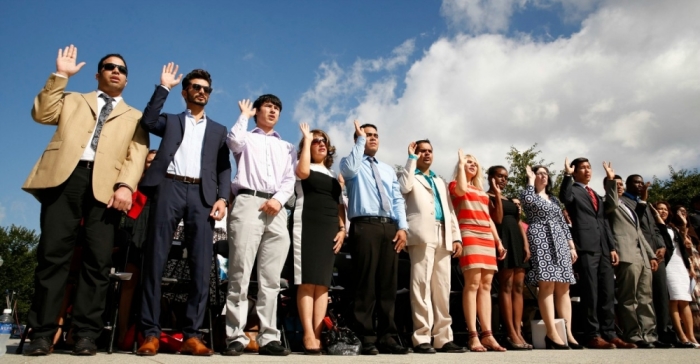USCIS Clarifies How New Citizens Can Refuse to Bear Arms for America for Religious Reasons

A new policy update issued by the U.S. Citizenship and Immigration Services (USCIS), which became effective Tuesday July 21, 2015, has clarified the conditions under which an individual becoming a naturalized U.S. citizen can refuse to bear arms for America for religious reasons.
In the update, the USCIS Policy Manual clarifies the eligibility requirements for modifications to the Oath of Allegiance for naturalization.
"In general, a naturalization applicant must take an oath of allegiance in a public ceremony, in addition to meeting other eligibility requirements, in order to naturalize. The oath includes the clauses to bear arms on behalf of the United States and to perform noncombatant service in the U.S. armed forces when required by law," explains the document.
"An applicant may be eligible for certain modifications to the oath to exclude the clauses based on religious training and belief or a conscientious objection. This guidance updates Volume 12 of the Policy Manual to clarify the eligibility requirements for the modifications," the document adds.
Policy Highlights:
- Explains eligibility requirements and standard of proof for modifications to the oath when an applicant is unwilling or unable to affirm to all clauses of the oath.
- Clarifies that an applicant may be eligible for modifications based on religious training and belief, or conscientious objection arising from a deeply held moral or ethical code.
- Clarifies that an applicant is not required to belong to a specific church or religion, follow a particular theology or belief, or to have had religious training in order to qualify.
- Clarifies that an applicant may submit, but is not required to provide, an attestation from a religious or other type of organization, as well as other evidence to establish eligibility.
Some Republicans and conservative news outlets have criticized the move.
In a statement, Sen, Tom Cotton, R-Ark., said the change "undermines what it means to be a citizen of the United States."
Kate Pavlich, Townhall.com editor, also expressed concern.
"Although the U.S. has a voluntary military without a draft, meaning citizens are not currently required by law to serve, these new exemptions are highly alarming should the country need to call on its citizens for defense in the future," she wrote.
"The United States has always allowed for exceptions to combat based on religious convictions, the Quakers are one example. However, Quakers have found different roles, i.e. as medics, inside the military to aid in the country's defense. This rule change allows naturalized citizens to refuse service altogether," she added.
The USCIS policy change is not creating a new policy, but clarifies an existing one. Declaring a willingness to bear arms in defense of the nation was added to the oath in the 1950s.
The federal government first allowed conscientious objectors to opt-out of combat military service during World War I. Before that, conscientious objector laws varied by state.




























